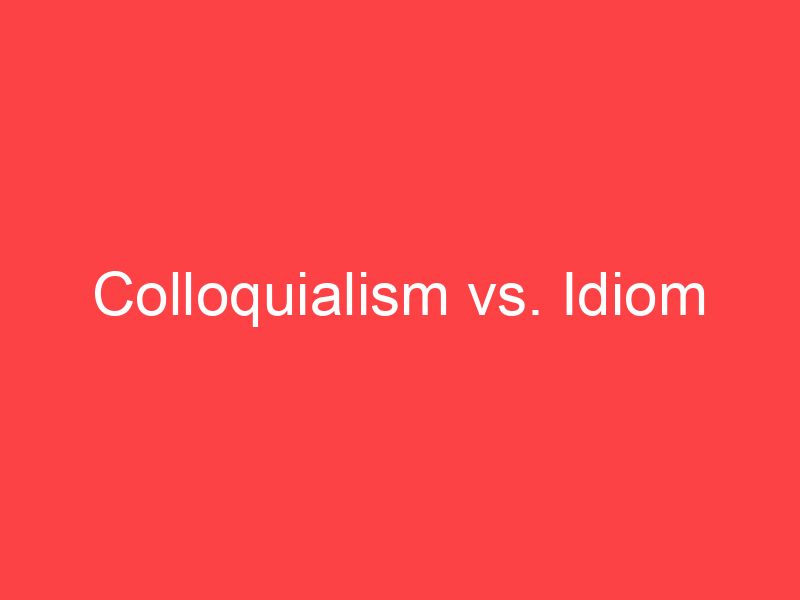Main Difference
The main difference between Colloquialism and Idiom is that the Colloquialism is a language that is used in daily life and Idiom is a combination of words that has a figurative meaning.
-
Colloquialism
Everyday language, everyday speech, common parlance, informal language, colloquial language, general parlance, or vernacular (but this has other meanings too), is the most used variety of a language, which is usually employed in conversation or other communication in informal situations.
An example of such language is called a colloquialism, or casualism. The most common term used by dictionaries to label such an expression is colloquial. Many people however misunderstand this label and confuse it with the word local because it sounds somewhat similar and because informal expressions are often only used in certain regions. (But a regionalism is not the same thing as a colloquialism, and a regionalism can be local formal speech). Much of the misunderstanding is ironically caused by the dictionary label itself being formal and not part of everyday speech. As a result, there is widespread confusion between colloquialisms and regionalisms and idioms even among dictionary users and perhaps especially among them. In addition to the problematic colloquial, Wiktionary also uses the universally understood label informal but does not define any difference between them.
The word colloquial by its etymology originally referred to speech as distinguished from writing, but colloquial register is fundamentally about the degree of informality or casualness rather than the medium, and some usage commentators thus prefer the term casualism.
-
Idiom
An idiom (Latin: idiomī, “special property”, from Ancient Greek: ἰδίωμα, translit. idíōma, “special feature, special phrasing, a peculiarity”, f. Ancient Greek: ἴδιος, translit. ídios, “one’s own”) is a phrase or an expression that has a figurative, or sometimes literal, meaning. Categorized as formulaic language, an idiom’s figurative meaning is different from the literal meaning. There are thousands of idioms, occurring frequently in all languages. It is estimated that there are at least twenty-five thousand idiomatic expressions in the English language.
-
Colloquialism (noun)
A colloquial word or phrase; a common spoken expression, often regional.
-
Idiom (noun)
A manner of speaking, a mode of expression peculiar to a language, person, or group of people.
-
Idiom (noun)
A language or language variety; specifically, a restricted dialect used in a given historical period, context etc.
-
Idiom (noun)
An established expression whose meaning is not deducible from the literal meanings of its component words, often peculiar to a given language.
-
Idiom (noun)
An artistic style (for example, in art, architecture, or music); an instance of such a style.
-
Idiom (noun)
A programming construct or phraseology that is characteristic of the language.
-
Colloquialism (noun)
a word or phrase that is not formal or literary and is used in ordinary or familiar conversation
“the colloquialisms of the streets”
-
Colloquialism (noun)
the use of colloquialisms
“speech allows for colloquialism and slang”
-
Idiom (noun)
a group of words established by usage as having a meaning not deducible from those of the individual words (e.g. over the moon, see the light).
-
Idiom (noun)
a form of expression natural to a language, person, or group of people
“he had a feeling for phrase and idiom”
-
Idiom (noun)
the dialect of a people or part of a country.
-
Idiom (noun)
a characteristic mode of expression in music or art
“they were both working in a neo-impressionist idiom”

